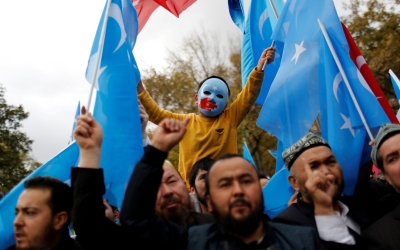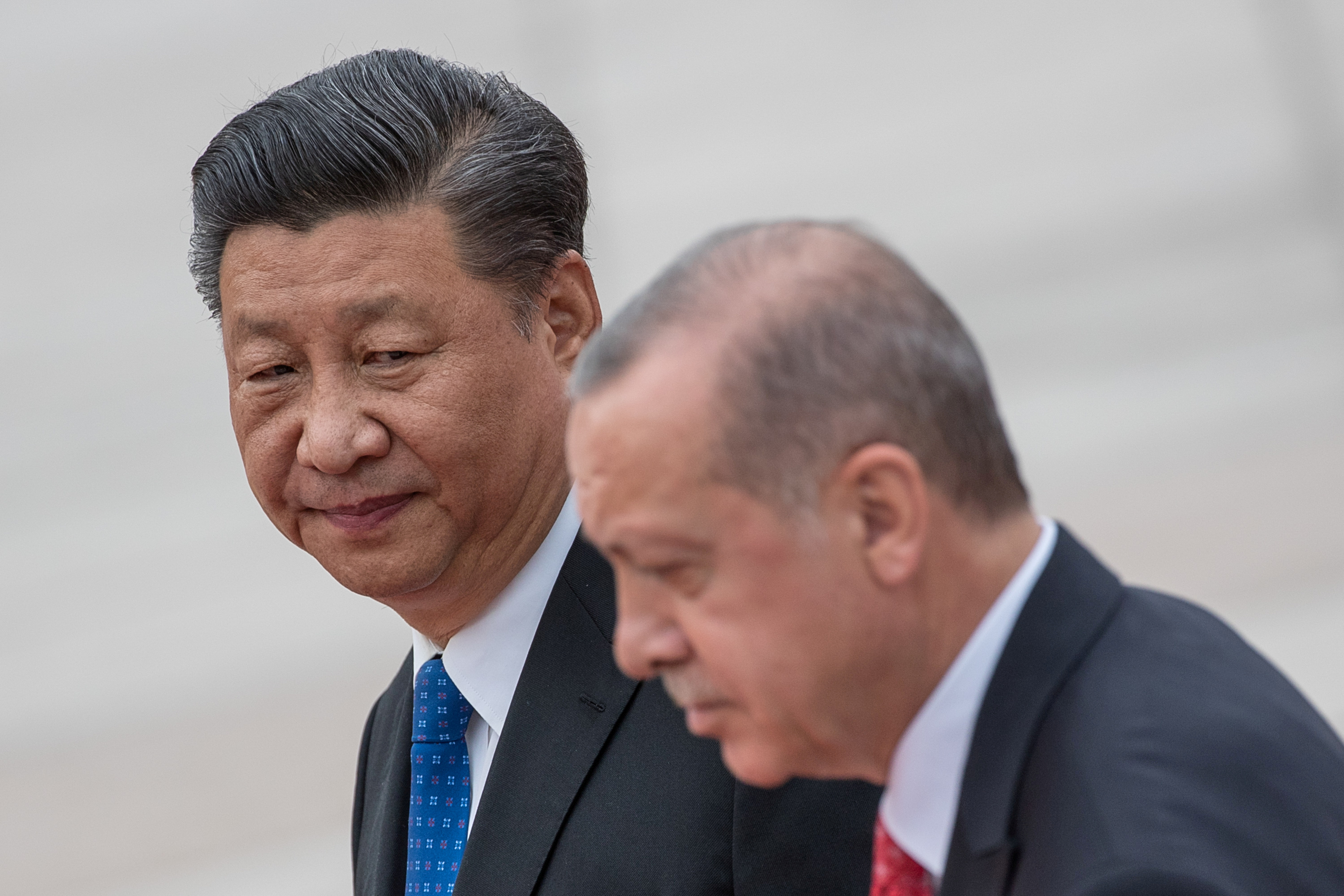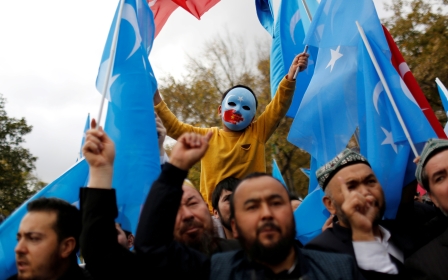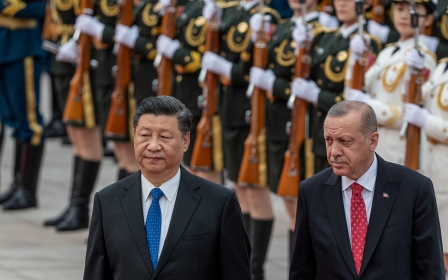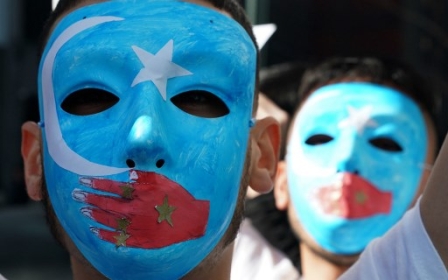Turkey says Uighur man threatened with deportation will not be expelled
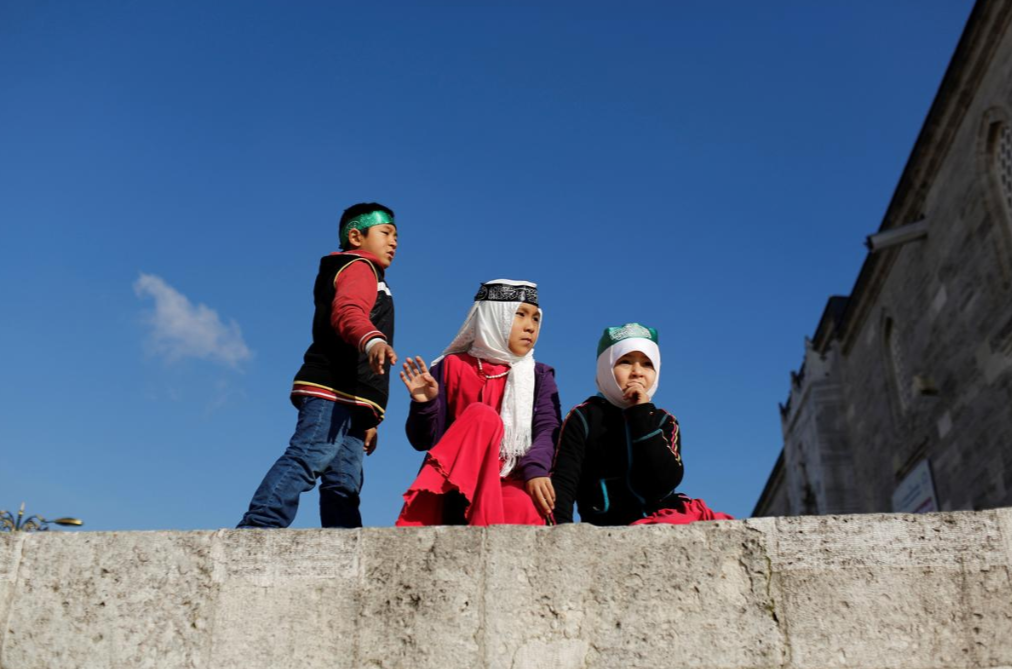
Turkey has said it will not expel a Uighur refugee whose case was highlighted by Middle East Eye after he was told by immigration authorities that he had 10 days to leave the country or face deportation.
A senior Turkish official, speaking on condition of anonymity, on Monday also told MEE that Turkey had not deported any Uighurs to China and would not do so in the future.
MEE last week reported on the case of Abuduaini Abulaiti, a Uighur who has lived in Turkey since 2012, who said his application to renew his long-term residency had been rejected in a letter which also threatened him with deportation if he did not leave the country.
But the Turkish Immigration Administration said in a statement on Sunday that Abulaiti would not be deported.
“The individual isn’t deported and there are not orders to deport him. He hasn't been taken to an immigrant deportation centre and is free to travel within the country," it said.
The immigration authority also said Abulaiti could apply for a short-term residency permit even though his application to renew his long-term residency had been rejected. It did not clarify why he had been refused long-term residency.
"Foreigners who have no safety or are under threat of torture and mistreatment in case of return to their own countries, won’t be expelled," it said.
The senior Turkish official, speaking anonymously, told MEE: "Abulaiti will be able to make an application for short term residency in Turkey. Even if his passport expired, he won't be deported."
Who are the Uighurs and why is China targeting them?
+ Show - HideAccording to multiple reports, more than one million Uighurs, a Muslim-majority Turkic people, are currently being held in internment camps across Xinjiang in western China (or occupied East Turkestan as many Uighurs refer to the region).
Human Rights Watch said in September 2018 that up to 13 million Muslims in Xinjiang have been subjected to “forced political indoctrination, collective punishment, restrictions on movement and communications, heightened religious restrictions, and mass surveillance in violation of international human rights law”.
The Uighurs have have been particularly targeted since Communist party leader Chen Quanguo became Xinjiang’s party secretary in 2016. Under his leadership, a massive surveillance infrastructure was unrolled across the region designed to monitor and control the Muslim community.
Uighurs and ethnic Kazakhs have been routinely rounded up for practising their Islamic faith, including praying, observing Halal, or wearing clothes synonymous with being Muslim.
The Chinese government has even labelled Islam an “ideological illness” and has destroyed some mosques in the region. In the camps, detainees are forced to learn Chinese Mandarin, praise the ruling Chinese Communist Party and face recurrent psychological and physical abuse.
Uighur activists say that entire families have disappeared into the camps, or have been executed.
China has repeatedly denied allegations that it is persecuting the minority group, instead describing the camps as “vocational training centres” designed to counter religious extremism.
It also calls concerns raised by Uighur community members, human rights groups and others “unjustified” and an “interference in China’s internal affairs”.
Another source with knowledge of the case, also speaking on condition of anonymity, told MEE that Turkey was carefully reviewing individuals who might have links to extremism.
"The Turkish government is maintaining a balanced and careful policy to support them and improve their living conditions while respecting Chinese sensitivities," the source said.
There is no suggestion that Abulaiti is involved in any activities of concern to the Turkish authorities.
Speaking to MEE from his home in Istanbul on Friday, he said he had been "shocked" to receive the letter telling him that his application to renew his residency, which he had submitted in 2017, had been rejected.
'I may face the same fate as my brothers'
Abulaiti said he escaped persecution in China, travelling through Malaysia, to eventually arrive in Turkey.
But three of his brothers have gone missing from China in the past two years, he said.
"I don't know what will happen to me if I go back. I may face the same fate as my brothers," he said.
China has been condemned by human rights organisations over the detention of hundreds of thousands of Uighurs, a mostly Muslim Turkic minority in China's western Xinjiang province, in internment camps.
The Chinese government describes the camps as "vocational training centres" and says they are designed to counter religious extremism.
Despite reassurances from Turkey, some Uighurs in the country say they remain concerned about their status in the country because of the difficulties they face in renewing their Chinese passports when they expire.
Abulaiti and other Uighurs spoken to by MEE said officials in China's embassy in Turkey had refused to issue them with new passports and had instead given them a document allowing them to return to China.
"Many Uighurs who went to Turkey faced automatic arrest when they returned and [were] sent to the camps," Abulaiti told MEE.
Abulaiti said he had previously been arrested by Chinese officials after visiting Turkey and returning home in 2010. His passport was subsequently confiscated and he was briefly banned from leaving the country.
He was allowed to leave the country in 2012 to attend his father's funeral in Turkey after civil servants and local officials from China who knew his family had confirmed his father's death.
But Abulaiti said he travelled to Turkey via Malaysia to avoid any suspicion from the Chinese authorities.
Turkey is estimated to be home to approximately 40,000 Uighur exiles, some of whom now hold Turkish citizenship.
Even though Ankara earlier this year criticised China over its mistreatment of the minority, it has largely preferred to voice its concerns in private, preferring to emphasise the close economic ties between the two countries.
Turkish President Recep Tayyip Erdogan did not raise the issue in public comments during a state visit to Beijing earlier this month, and Turkey was not among signatories of a recent letter sent by 22 countries to the United Nations Human Rights Council which called for an investigation into the treatment of the Uighurs inside China.
Middle East Eye propose une couverture et une analyse indépendantes et incomparables du Moyen-Orient, de l’Afrique du Nord et d’autres régions du monde. Pour en savoir plus sur la reprise de ce contenu et les frais qui s’appliquent, veuillez remplir ce formulaire [en anglais]. Pour en savoir plus sur MEE, cliquez ici [en anglais].


